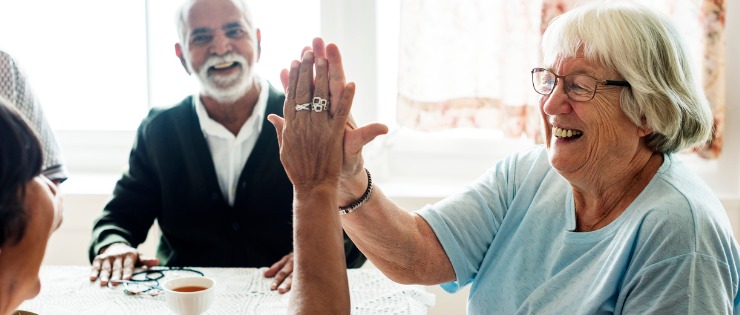
Old age brings with it physical and mental health challenges.
Psychological wellbeing may be a protective factor in health by reducing the risk of chronic illness and promoting longevity. Research shows physical health and subjective wellbeing is a two-way relationship. If you can look after your physical and mental health, you’re likely to lead a happier, longer life.
Healthy Ageing
Research shows that there are five main issues that impact the mental health and well-being of older people. They include:
- Age discrimination
- Participation and having a sense of purpose
- Maintaining relationships
- Physical health
- Finances
There’s plenty you can do to start looking after your mental health and well-being as you age. Try these 10 tips to stay mentally healthy.
#1 Talk About How You’re Feeling
Depression can happen to any of us in our lifetime. But as we age the loss of loved ones, isolation and loneliness, or poor physical health can cause depression. It's not an inevitable part of ageing, but it shouldn’t be overlooked.

If you’re feeling depressed or anxious, the most important action you can take is to tell someone. Speak to a friend, your doctor or a counsellor rather let it continue untreated.
Not everyone recognises when they are depressed, but the following are common signs to look out for:
- Feeling down, sad or miserable most of the time
- Loss of interest or pleasure in things you once enjoyed
- Feeling overwhelmed, guilty, frustrated, indecisive and lacking confidence
- Withdrawn from family and friends
- Unable to concentrate and can’t get things done
- Physical symptoms like tiredness, sickness, sleep, gut problems, weight loss or gain
#2 Eat a Healthy & Balanced Diet
Eating a healthy and well-balanced diet becomes extremely important as we age. Studies show that ageing is linked to the development of micronutrient deficiencies. Eating a nutritious diet can help keep your brain and body in good condition.
Vitamin B
Make sure you eat foods that contain enough B group vitamins as they help cells multiply and make new DNA. Vitamin B is water-soluble and can’t be stored in the body so the only way to get enough of the vitamin is to eat it regularly.

Foods High in Vitamin B
Pork, legumes and leafy greens eaten regularly will keep up your levels of vitamin B.
Omega-3 Fatty Acids
Polyunsaturated fats (especially omega-3s) can help with maintaining neural structure and function. Omega-3 fats can improve symptoms of depression, bipolar depression and help prevent psychosis.
Foods High in Omega-3
Oily fish such as sardines, salmon and mackerel have the highest quantities of omega-3 followed by nuts, seeds and oysters.
Zinc
The brain requires zinc to complete necessary chemical reactions. A deficiency in zinc is linked to depressive symptoms.
Foods High in Zinc
Zinc is highest in lean meats, oysters, nuts, pumpkin seeds, whole grains and nuts.
#3 Be Prepared for Changes
No one likes the physical and mental changes that come with ageing. You may not be as quick on your feet or your mind isn’t as sharp as it once was.
In terms of physical changes, seniors may notice the following:
Bones – become weaker and smaller in size making you at risk of falls, joints are painful, and your mobility suffers.
Digestive system – your metabolism slows, and digesting food is more difficult for your gastrointestinal tract.
Senses – you have a reduced sense of smell, touch, taste and sight.
Mouth – teeth are more susceptible to cavities and gum disease is more likely. Some medications can cause dry mouth.
Accepting these changes as part of life and doing what you can to keep yourself healthy, means you’re less likely to suffer from low mood and depression.
#4 Ask for Help

In our later years, it’s difficult to do all the tasks we once did. Everything from gardening, house cleaning and driving to the shops becomes hard work. You could be restricted with mobility issues, lack of physical strength, and suffer from medical conditions. It might be difficult to complete weekly or spring cleaning, gardening, meal preparation and shopping.
Rather than struggling with a chore or being frustrated, you can’t do it, ask someone who can help.
Help Around the Home
Most people are happy to help someone but if you don’t have family or friends who can help regularly, it may be time to get some outside help. Having people come into your home to perform chores you can no longer perform, will help you stay in your own home longer before entering a care facility. For many people, living in their own home for as long as possible is important for their mental wellbeing.
#5 Be Socially Active
Whether you live in your own home or in a shared facility surrounded by people, you’re at risk of feeling lonely.
Researchers have found loneliness to be one of the major causes of poor mental health and even physical health in elderly. Being lonely may be a bigger threat to premature death than smoking or obesity. Not being in regular contact with other people is isolating and can make the days feel long.

Avoid Social Isolation
It gets much harder to be social in old age. You may not drive, or you aren’t in contact with family because of distance. Many of your old friends may be unwell or have passed away. Some elderly people live in financial hardship and being social is too expensive.
Maintain Your Social Network
Try to fill your calendar with regular catch-ups with friends and family, activities and hobbies, so there is always something to look forward to. Stimulating conversations helps keep your brain active. Keeping yourself busy means you stay socially connected.
Technology is helping to reduce loneliness. A study conducted in 2016 found that information communication and technology did have a positive impact on social connectedness and boosted self-confidence. Social media platforms can help people can keep in touch with friends and family members.
If you need to learn how to use a computer or social media, you may be able to learn through a community course or ask a family member to help you learn the basics.
#6 Be Physically Active
Being physically active can have a big impact on your health and wellbeing. Exercise releases feel-good chemicals endorphins in the brain which improve mood and reduce stress. Exercise can be more difficult to do as we age, but most people can do light exercise.
How You Can Be More Physically Active

There are many ways you can be more active throughout the day. All adults aged 65 years or older are recommended to do at least 30 minutes of moderate activity every day. But if you suffer from a health condition or mobility issues, try to break this up into shorter 10-minute sessions. For some ideas you can try:
- Gardening
- Walking
- Taking the stairs
- Swimming
- Cycling
- Dancing
Even if you can’t stand, try to do some stretching exercises from your chair to improve blood circulation and keep your muscles strong. Weight-bearing exercise or strength training can help with bone strength. Try to include some balancing activities to reduce your risk of falls. Take a look at the article about the unexpected benefits of cycling for over 60’s.
#7 Stay Mentally Active
Use it or lose it, as the saying goes. Your brain needs as much exercise as your body. Researchers in the US found that mental exercise can improve memory loss by 30 to 50%. Regular workouts ensure brain function doesn’t decline.
Activities for Mental Activity
Get a regular dose of mental fitness by doing:
- Crosswords
- Brain teasers and quizzes
- Board games like Yahtzee, Scrabble, Trivial Pursuit, chess or cards
- Learn a new language
- Read the paper or a book daily
- Do a course on a subject you’re interested in
- Take up a new hobby
#8 Don’t Stop Working
Just because you’ve retired from the paid workforce, doesn’t mean you should step back from work altogether. When their paid work career ceases, they can lose their purpose in life. Being meaningfully active gives many people a sense of purpose.
Many seniors enjoy volunteer work. It gives them a sense of goodwill because they’re contributing to society. Volunteer work also helps combat loneliness and depression because it allows people to spend time away from the house and meet a new circle of people.
Volunteer Opportunities
Some people struggle to find volunteer work that’s suitable in terms of its physical requirements or interests them. A good place to start is with your local council. They can put you in touch with local groups and associations in your community looking for volunteers to help on a regular or ad hoc basis.
#9 Join a Social Group

There are many groups available in all metropolitan areas of Australia where seniors can get together with others to join in an activity. Some of the most well-known are men’s sheds, knitting groups, shopping centre walking groups, outdoor exercise classes, cyclists and walkers, and bushland carers to name a few. Talk to your friends and family about finding available groups in your area.
#10 Have a Plan
Many people worry continually which can take a toll on their mental wellbeing. Older people may start to worry about their financial situation, their will, funeral costs, caring for others, family relationship problems, transport and their physical and mental health.
If you worry about something, draw up a plan for how you can overcome the problem. It may involve doing some research or asking a family member to help. Whether you write up a plan or talk it through with someone, you are more likely to find a solution for this and any future problem.
We can’t plan everything in life. Sometimes things change that you have no influence over. Try to remember that’s life and to be flexible. Being worried or angry solves nothing. Rather than stewing on something, talk about it with someone or ask for help.
Maintaining your mental health and well-being is vital as you age. If you want to stay mentally healthy later in life, then you should follow these tips and start making a change today.